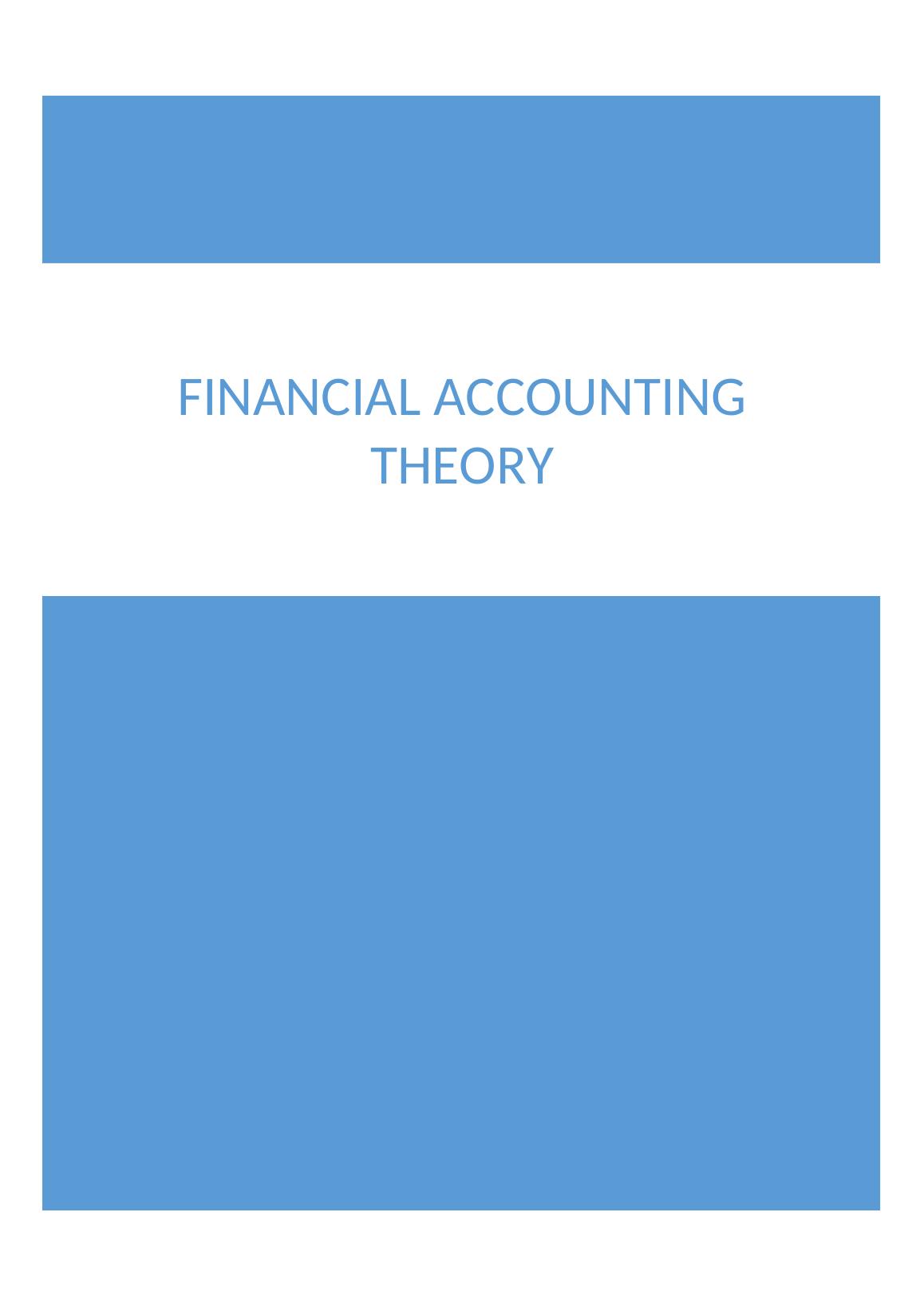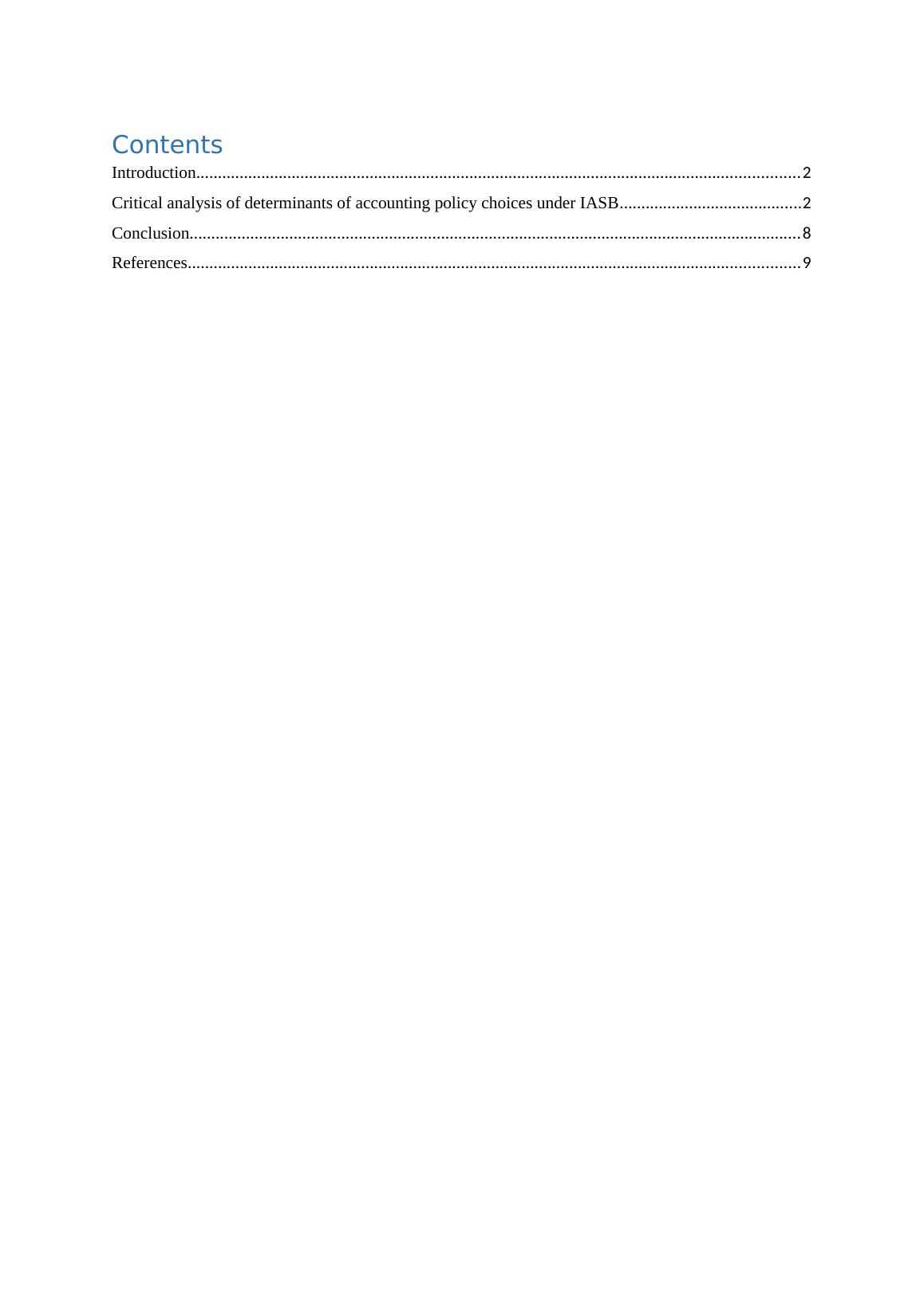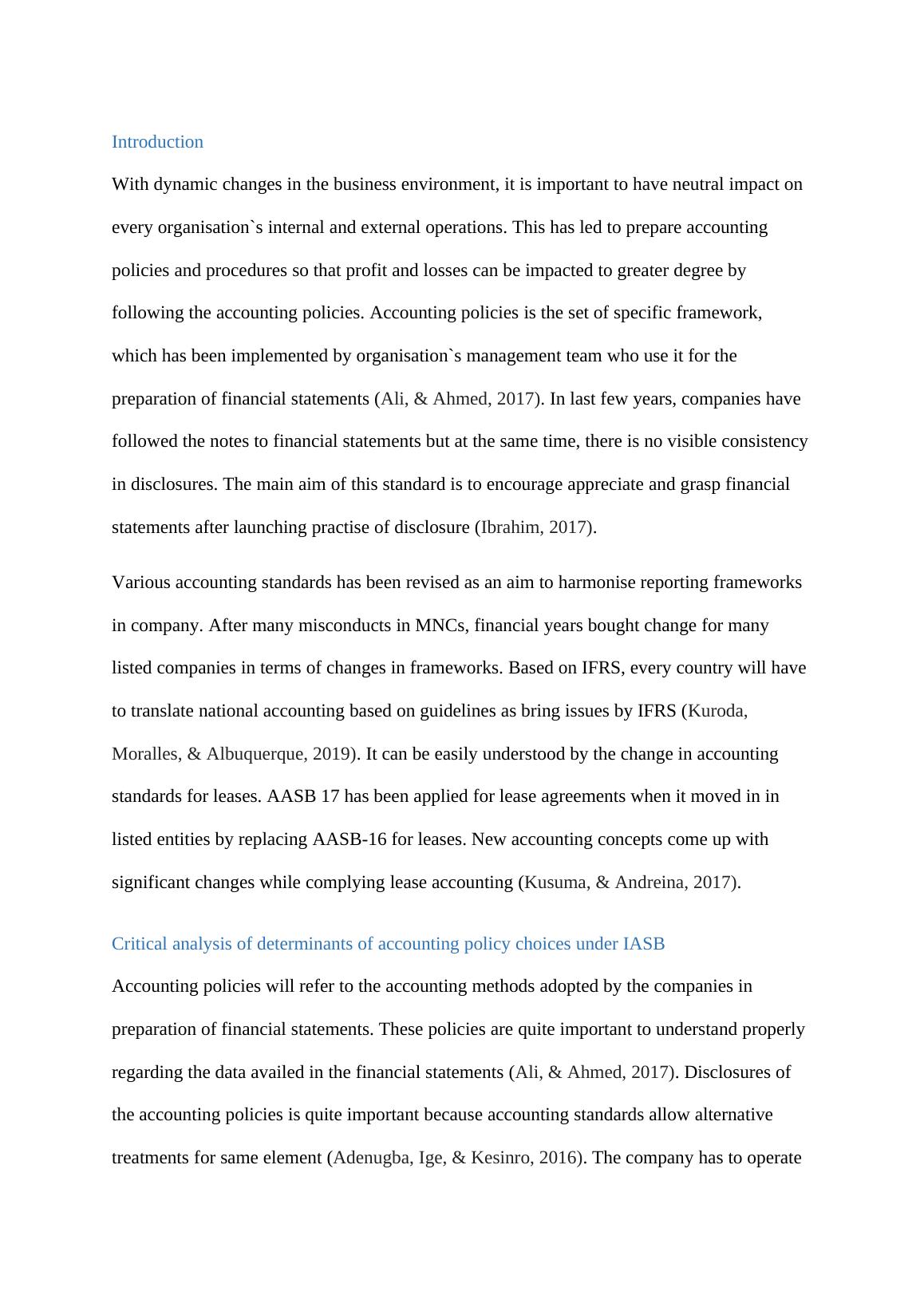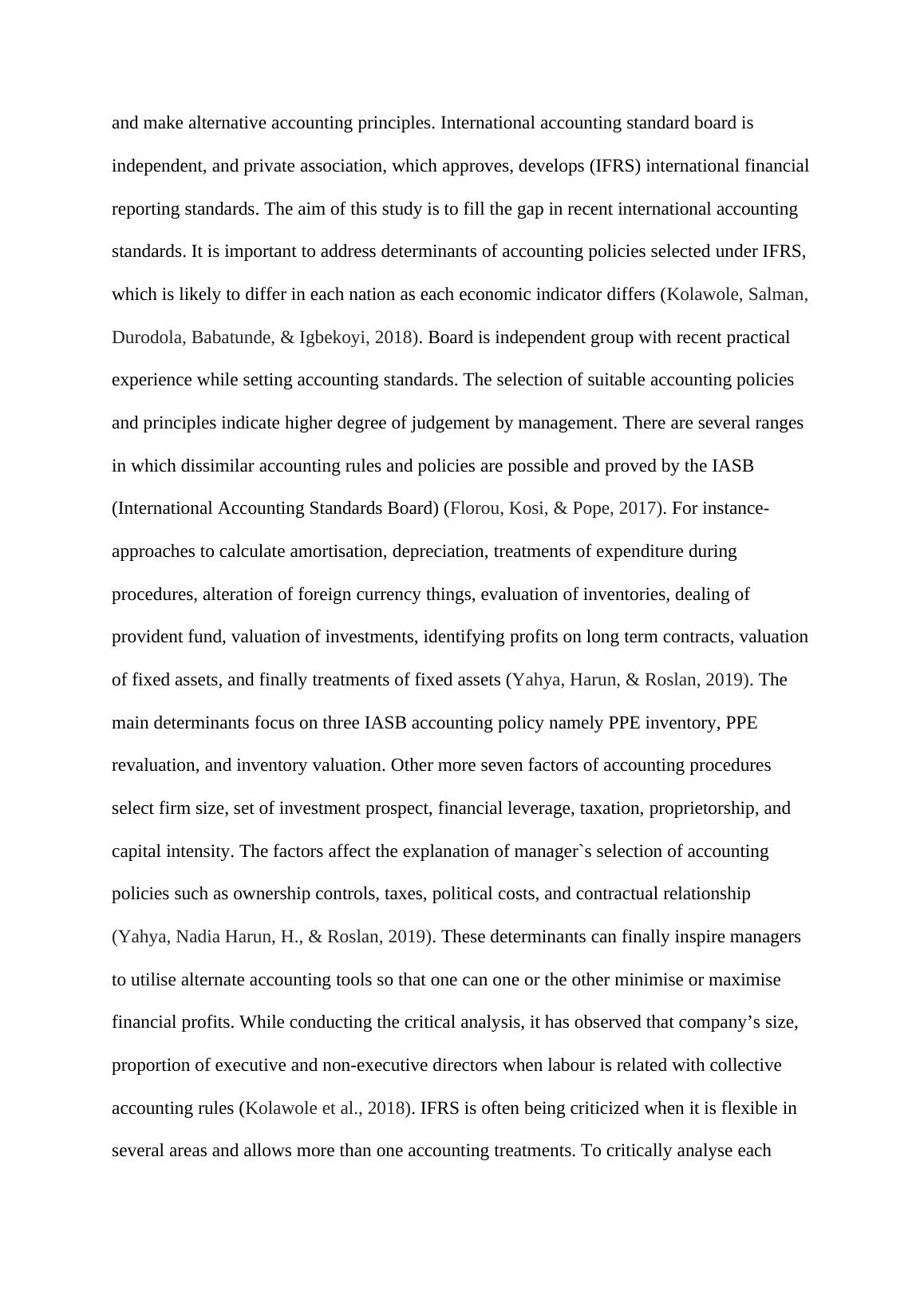Financial Accounting 2022 Theory
Added on 2022-09-15
12 Pages3475 Words17 Views
FINANCIAL ACCOUNTING
THEORY
THEORY

Contents
Introduction............................................................................................................... 2
Critical analysis of determinants of accounting policy choices under IASB.................................2
Conclusion................................................................................................................ 8
References................................................................................................................ 9
Introduction............................................................................................................... 2
Critical analysis of determinants of accounting policy choices under IASB.................................2
Conclusion................................................................................................................ 8
References................................................................................................................ 9

Introduction
With dynamic changes in the business environment, it is important to have neutral impact on
every organisation`s internal and external operations. This has led to prepare accounting
policies and procedures so that profit and losses can be impacted to greater degree by
following the accounting policies. Accounting policies is the set of specific framework,
which has been implemented by organisation`s management team who use it for the
preparation of financial statements (Ali, & Ahmed, 2017). In last few years, companies have
followed the notes to financial statements but at the same time, there is no visible consistency
in disclosures. The main aim of this standard is to encourage appreciate and grasp financial
statements after launching practise of disclosure (Ibrahim, 2017).
Various accounting standards has been revised as an aim to harmonise reporting frameworks
in company. After many misconducts in MNCs, financial years bought change for many
listed companies in terms of changes in frameworks. Based on IFRS, every country will have
to translate national accounting based on guidelines as bring issues by IFRS (Kuroda,
Moralles, & Albuquerque, 2019). It can be easily understood by the change in accounting
standards for leases. AASB 17 has been applied for lease agreements when it moved in in
listed entities by replacing AASB-16 for leases. New accounting concepts come up with
significant changes while complying lease accounting (Kusuma, & Andreina, 2017).
Critical analysis of determinants of accounting policy choices under IASB
Accounting policies will refer to the accounting methods adopted by the companies in
preparation of financial statements. These policies are quite important to understand properly
regarding the data availed in the financial statements (Ali, & Ahmed, 2017). Disclosures of
the accounting policies is quite important because accounting standards allow alternative
treatments for same element (Adenugba, Ige, & Kesinro, 2016). The company has to operate
With dynamic changes in the business environment, it is important to have neutral impact on
every organisation`s internal and external operations. This has led to prepare accounting
policies and procedures so that profit and losses can be impacted to greater degree by
following the accounting policies. Accounting policies is the set of specific framework,
which has been implemented by organisation`s management team who use it for the
preparation of financial statements (Ali, & Ahmed, 2017). In last few years, companies have
followed the notes to financial statements but at the same time, there is no visible consistency
in disclosures. The main aim of this standard is to encourage appreciate and grasp financial
statements after launching practise of disclosure (Ibrahim, 2017).
Various accounting standards has been revised as an aim to harmonise reporting frameworks
in company. After many misconducts in MNCs, financial years bought change for many
listed companies in terms of changes in frameworks. Based on IFRS, every country will have
to translate national accounting based on guidelines as bring issues by IFRS (Kuroda,
Moralles, & Albuquerque, 2019). It can be easily understood by the change in accounting
standards for leases. AASB 17 has been applied for lease agreements when it moved in in
listed entities by replacing AASB-16 for leases. New accounting concepts come up with
significant changes while complying lease accounting (Kusuma, & Andreina, 2017).
Critical analysis of determinants of accounting policy choices under IASB
Accounting policies will refer to the accounting methods adopted by the companies in
preparation of financial statements. These policies are quite important to understand properly
regarding the data availed in the financial statements (Ali, & Ahmed, 2017). Disclosures of
the accounting policies is quite important because accounting standards allow alternative
treatments for same element (Adenugba, Ige, & Kesinro, 2016). The company has to operate

and make alternative accounting principles. International accounting standard board is
independent, and private association, which approves, develops (IFRS) international financial
reporting standards. The aim of this study is to fill the gap in recent international accounting
standards. It is important to address determinants of accounting policies selected under IFRS,
which is likely to differ in each nation as each economic indicator differs (Kolawole, Salman,
Durodola, Babatunde, & Igbekoyi, 2018). Board is independent group with recent practical
experience while setting accounting standards. The selection of suitable accounting policies
and principles indicate higher degree of judgement by management. There are several ranges
in which dissimilar accounting rules and policies are possible and proved by the IASB
(International Accounting Standards Board) (Florou, Kosi, & Pope, 2017). For instance-
approaches to calculate amortisation, depreciation, treatments of expenditure during
procedures, alteration of foreign currency things, evaluation of inventories, dealing of
provident fund, valuation of investments, identifying profits on long term contracts, valuation
of fixed assets, and finally treatments of fixed assets (Yahya, Harun, & Roslan, 2019). The
main determinants focus on three IASB accounting policy namely PPE inventory, PPE
revaluation, and inventory valuation. Other more seven factors of accounting procedures
select firm size, set of investment prospect, financial leverage, taxation, proprietorship, and
capital intensity. The factors affect the explanation of manager`s selection of accounting
policies such as ownership controls, taxes, political costs, and contractual relationship
(Yahya, Nadia Harun, H., & Roslan, 2019). These determinants can finally inspire managers
to utilise alternate accounting tools so that one can one or the other minimise or maximise
financial profits. While conducting the critical analysis, it has observed that company’s size,
proportion of executive and non-executive directors when labour is related with collective
accounting rules (Kolawole et al., 2018). IFRS is often being criticized when it is flexible in
several areas and allows more than one accounting treatments. To critically analyse each
independent, and private association, which approves, develops (IFRS) international financial
reporting standards. The aim of this study is to fill the gap in recent international accounting
standards. It is important to address determinants of accounting policies selected under IFRS,
which is likely to differ in each nation as each economic indicator differs (Kolawole, Salman,
Durodola, Babatunde, & Igbekoyi, 2018). Board is independent group with recent practical
experience while setting accounting standards. The selection of suitable accounting policies
and principles indicate higher degree of judgement by management. There are several ranges
in which dissimilar accounting rules and policies are possible and proved by the IASB
(International Accounting Standards Board) (Florou, Kosi, & Pope, 2017). For instance-
approaches to calculate amortisation, depreciation, treatments of expenditure during
procedures, alteration of foreign currency things, evaluation of inventories, dealing of
provident fund, valuation of investments, identifying profits on long term contracts, valuation
of fixed assets, and finally treatments of fixed assets (Yahya, Harun, & Roslan, 2019). The
main determinants focus on three IASB accounting policy namely PPE inventory, PPE
revaluation, and inventory valuation. Other more seven factors of accounting procedures
select firm size, set of investment prospect, financial leverage, taxation, proprietorship, and
capital intensity. The factors affect the explanation of manager`s selection of accounting
policies such as ownership controls, taxes, political costs, and contractual relationship
(Yahya, Nadia Harun, H., & Roslan, 2019). These determinants can finally inspire managers
to utilise alternate accounting tools so that one can one or the other minimise or maximise
financial profits. While conducting the critical analysis, it has observed that company’s size,
proportion of executive and non-executive directors when labour is related with collective
accounting rules (Kolawole et al., 2018). IFRS is often being criticized when it is flexible in
several areas and allows more than one accounting treatments. To critically analyse each

End of preview
Want to access all the pages? Upload your documents or become a member.
Related Documents
Advanced Financial Accountinglg...
|8
|1542
|92
Accounting and Financial Managementlg...
|9
|1494
|98
The Regulatory Environment for Financial Reportinglg...
|6
|835
|56
The Regulatory Environment and Financial Reportinglg...
|7
|848
|75
Accounting for Leaseslg...
|13
|3605
|100
Key Sources of Financial Reporting in Australialg...
|8
|1656
|73